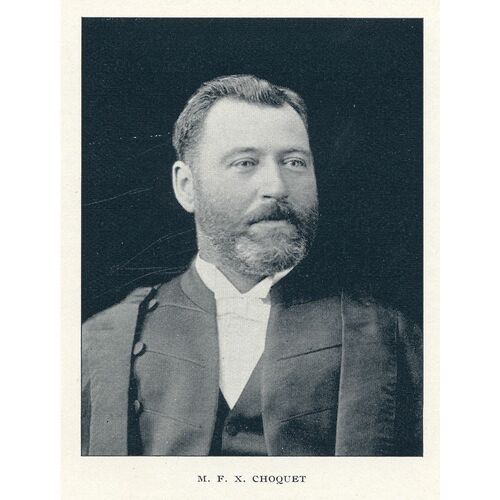CHOQUET, FRANÇOIS-XAVIER, lawyer, judge, and social reformer; b. 8 Jan. 1851 in Varennes, Lower Canada, son of Jean-Baptiste Choquet, a farmer, and Adéline Provost; m. 10 June 1884 Marie-Caroline Barry in Trois-Pistoles, Que.; they had no children; d. 31 Dec. 1926 in Montreal.
François-Xavier Choquet was born to a farming family in Varennes which placed a high value on education and permitted him to attend the Collège de L’Assomption from 1863 to 1869 and the Petit Séminaire de Montréal from 1869 to 1871. Following his classical education, he pursued legal training in the Montreal office of Louis-Amable Jetté* and at McGill College. He received a bcl in 1874 and was called to the bar the following year. He practised with Jetté and Frédéric-Ligori Béïque*, both prominent Liberals, until 1878 when Jetté was named to the Superior Court. For years he had his own firm and then in 1886 he joined another prestigious partnership, also headed by Rouges, that of Honoré Mercier*, Cléophas Beausoleil*, and Paul-Gédéon Martineau. After Mercier departed in 1891 the firm was renamed Beausoleil et Choquet and the following year it became Beausoleil, Choquet et Girard. Choquet’s Liberal connections are evident in his choice of associates and are confirmed in his work; it was his firm that was charged with handling all electoral disputes for the Liberal party.
During the 1890s Choquet’s fine legal reputation was rewarded: on 7 March 1893 he obtained a federal nomination as qc and from 1894 to 1897 he served as a member of the council of the Montreal bar. His political commitment was an additional factor in his appointments as a commissioner to revise the charter of Montreal (September 1897), as a judge of sessions of the peace, police magistrate, and licence commissioner (24 Dec. 1898), and as a federal extradition commissioner (20 July 1901). He would remain active as judge and extradition commissioner for more than 20 years.
In the first decade of the 20th century Choquet became a social reformer, advocating child welfare. In this activity he was joined by his wife, Marie-Caroline Barry. The couple worked to establish the Children’s Aid Society of Montreal and in 1908 Choquet became its first president. Marie-Caroline was one of the three vice-presidents. The Choquets vigorously supported the federal Juvenile Delinquents Act, passed in 1908. The act provided for the establishment of provincial and municipal juvenile courts with wide powers of investigation and sentencing and it forbade the incarceration of young offenders with adults. In 1910 the Quebec government proclaimed the act and took steps to create a juvenile court in Montreal. The Montreal Juvenile Delinquents’ Court officially opened in March 1912 with Choquet as its first judge.
At the court’s opening, Choquet shared his understanding of the legislation’s aims, that each young delinquent “be treated, not as a criminal, but as a misdirected and misguided child, and one needing aid, encouragement, help, and assistance.” For more than a decade Choquet served as judge of the juvenile court, embracing child-saving ideas prominent in English-speaking Canada and in the United States. The press, with affection and deference, named him the Children’s Judge and his recasting of a law court into a “home of mercy” was lauded as a sign of progress. He was a strong supporter of probation in lieu of confinement but did support the Borstal system for youthful offenders (a system developed at Borstal prison, in Kent, England, which included education, work, vocational training, and group counselling). Working with him in the court were probation officers Rose Henderson* and Marie Clément and clerk Owen Dawson. He stepped down as judge in April 1922. The Montreal juvenile court had been shaped by the presence of this fatherly figure whose progressive ideals irreversibly altered the treatment of youthful offenders in the city.
During his long and distinguished career François-Xavier Choquet had earned a reputation as a compassionate friend of youth and a tireless servant of the state. He died in 1926 after a brief illness; his funeral cortège included senators Béïque and Donat Raymond and several ministers and judges.
François-Xavier Choquet is the author of “The juvenile court,” an article published in the Canadian Municipal Journal (Montreal), 10 (1914): 232–33.
LAC, MG 30, C27, 7: 25A.35.4 (letter from K. Weller to W. L. Scott). Le Devoir, 23 mars 1912. Gazette (Montreal), 24 Oct. 1907, 1 Jan. 1927. Montreal Daily Star, 4 Jan. 1927. Montreal Herald, 3 Jan., 8 June 1912; 3 March 1914; 11, 20 April 1922. La Presse, 13 janv., 8 juin 1923; 3 janv. 1927. W. H. Atherton, Montreal, 1534–1914 (3v., Montreal, 1914). I.-J. Deslauriers, Les tribunaux du Québec et leurs juges: Cour provinciale, Cour des sessions de la paix, Tribunal de la jeunesse, Cour municipale (Cowansville, Qué., 1987). L. E. Mendelsohn, “History of the Montreal juvenile court: an historical-descriptive study of the Montreal juvenile court, later known as the Social Welfare Court” (msw research report, McGill Univ., Montreal, 1969). Tamara Myers, “The voluntary delinquent: parents, daughters, and the Montreal Juvenile Delinquents’ Court, 1918,” CHR, 80 (1999): 242–68. Jean Trépanier et Françoise Tulkens, Délinquance & protection de la jeunesse: aux sources des lois belge et canadienne sur l’enfance (Montréal, 1995).
Cite This Article
Tamara Myers, “CHOQUET, FRANÇOIS-XAVIER,” in Dictionary of Canadian Biography, vol. 15, University of Toronto/Université Laval, 2003–, accessed December 20, 2024, https://www.biographi.ca/en/bio/choquet_francois_xavier_15E.html.
The citation above shows the format for footnotes and endnotes according to the Chicago manual of style (16th edition). Information to be used in other citation formats:
| Permalink: | https://www.biographi.ca/en/bio/choquet_francois_xavier_15E.html |
| Author of Article: | Tamara Myers |
| Title of Article: | CHOQUET, FRANÇOIS-XAVIER |
| Publication Name: | Dictionary of Canadian Biography, vol. 15 |
| Publisher: | University of Toronto/Université Laval |
| Year of publication: | 2005 |
| Year of revision: | 2005 |
| Access Date: | December 20, 2024 |


![M. F. X. Choquet [image fixe] Original title: M. F. X. Choquet [image fixe]](/bioimages/w600.7259.jpg)

